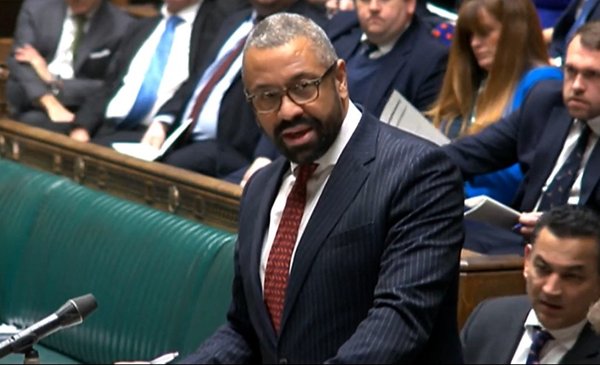The British government revealed it would reduce net migration after levels surged to a record high through a five-point plan that would change the current criteria for granting visas to foreigners.
The changes include increasing the minimum wage required for skilled foreign workers from £26,200 to £38,700.
Home Secretary James Cleverly said around 300,000 people who were eligible to come to the UK last year would not be able to come to the UK in future.
In a statement to MPs, the minister said migration to the UK “must be slowed” and “abuse” of health and care visas had occurred for years.
“Enough is enough,” said Cleverly. “Immigration policy must be fair, legal and sustainable.”
The migration plans come as official figures last month showed net migration numbers had jumped to a record 745,000 in 2022.
Conservative MPs have since stepped up pressure on Prime Minister Rishi Sunak and his government to reduce net migration, namely the difference between those entering and leaving the UK.
The Conservative Party’s 2019 election manifesto promised to reduce the number, without setting a specific target, while David Cameron once promised to reduce migration numbers to below 100,000 when he was prime minister.
Immigration is emerging as a key issue ahead of the next general election, scheduled for 2024.
With Labor leading in opinion polls, Sunak promised to do whatever it takes to reduce net migration.
As well as new pay requirements, the government said it would ban health and care workers from bringing their family dependents to the UK. It would also end companies’ ability to pay workers 20% less than the prevailing wage for jobs on the scarce jobs list.
Another item in the new regulations is an increase in the annual fee paid by foreign workers to use the National Health Service (NHS) from £624 to £1,035 and will see an increase in the minimum income for a family visa to £38,700 (previously £26,200). , starting next spring.
Government migration advisers also asked to review postgraduate visa routes to “prevent abuses”
According to the minister’s statement in Parliament, the changes will come into effect in spring next year.
Labour’s shadow home minister, Yvette Cooper, said the announcement was “an acknowledgment of the Conservative Party’s failures over many years in both the immigration system and the economy”.
And he added that although net migration “should be falling”, the Conservative Party “failed to deliver more substantial reforms linking immigration to training and fair pay requirements in the UK, meaning many sectors will continue to see the number of work visas increase due to skills. lack.
The general secretary of Unison, the civil service union, Christina McAnea, said: “This cruel plan spells complete disaster for the NHS and social services.”
“Migrant workers are encouraged to come here because both sectors are severely understaffed. Hospitals and nursing homes would not be able to function without them,” he said.
The plans were welcomed by some Conservative MPs, and former cabinet minister Simon Clarke called the changes a “serious” and “credible” step.
But Cleverly’s predecessor as Home Affairs Minister, Suella Braverman, was less impressed.
He said the package came “too late and the government could have gone further” in terms of salary requirements and “shortening the graduate pipeline”.
Braverman said he had put forward similar proposals six times when he was Home Secretary “but the delays have reduced their impact”.
The latest statistics show the challenges ministers will face in reducing migration to the health sector, which relies heavily on employing foreign workers.
The government said that in the year ending September 2023, 101,000 visas were issued to special care workers.
An estimated 120,000 visas were granted to dependent family members of the workers, the government said.
The special needs services sector (disabled, elderly, post-operative, etc.) faces staff shortages and healthcare providers refuse to limit their ability to employ foreign workers.
The government’s migration adviser previously said “persistent underfunding” at councils, which fund the majority of adult social services, was the biggest factor in the staffing crisis.
Minister Cleverly acknowledged that some care workers may be deterred from coming to the UK because they cannot bring family under the new rules, although he believes there will still be care workers willing to work in the UK under the new rules. new condition.
(With information from agency)

“Internet trailblazer. Troublemaker. Passionate alcohol lover. Beer advocate. Zombie ninja.”







